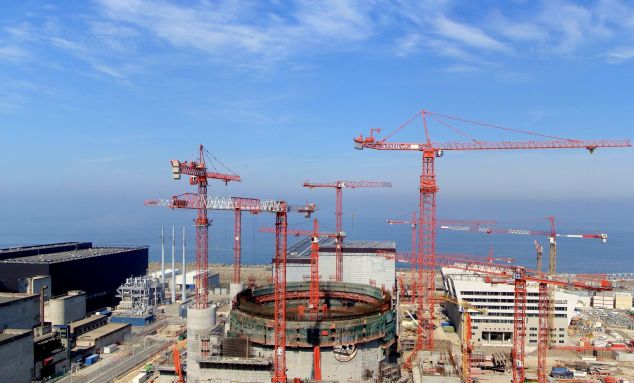Nuclear energy in France (26.01.2023)
• In addition to the expansion of renewable energies, France's multi-annual energy plan (Programmation pluriannuelle de l'énergie – PPE) also provides for an extension of the lifetimes of existing nuclear power plants and the construction of six new EPR2 reactors at existing sites. In addition, the implementation of eight further new constructions is being examined.
• With NUWARD, the construction of an SMR prototype is to start in 2030.
• The share of nuclear energy in electricity generation is to be reduced to 50 % by 2035.
Status quo of electricity generation
At the end of 2021, the installed nuclear capacity in France was around 139 gigawatts. Almost half of this, namely 61 gigawatts, is accounted for by the 56 nuclear power plants that the country operates. In percentage terms, nuclear generation capacity accounted for around 70 % of the electricity mix (terawatt-hours generated) in 2021 – thus, France has the largest share of nuclear generation in the country's generation mix in global terms (see figure).

Political and legal framework conditions
For the next decades, France is focusing on the further decarbonisation of its electricity mix. In addition, it is intended to increase energy supply by 60%, as President Macron announced at the beginning of 2022. To achieve these goals, renewable generation capacities are to be greatly expanded. Furthermore, nuclear capacities will continue to be used. It is planned to replace parts of the existing power plant fleet by new EPR2 (or possibly other types) and also to build new plants.
The Council of Ministers approved a bill in November 2022 aimed at accelerating such projects for the construction of new nuclear plants near or at existing nuclear power plant sites, mentioning the Penly site as a proposal. Concrete plans for plants with an intended start of operation between 2035 and 2037 are to be submitted in 2023.
Current plans and projects
Large NPPs. At the Flamanville site, the electricity provider Électricité de France (EdF) has been building a third power plant unit, the European Pressurised Water Reactor (EPR), since 2007. Various problems during construction (related, among other things, to the quality of the steel used, welding seams, ...) caused both the cost and time planning to get out of hand so that the planned commissioning of originally 2012 is currently stated to take place in the first quarter of 2024.

As part of the French energy plan, EdF also envisages the construction of six EPR2 by 2035 to 2037, which is a modernised version of the pressurised water reactor EPR. EdF proposes Penly, Gravelines, Bugey or Tricastin as possible sites.
SMR. France's government has announced around one billion euros for research and development projects for nuclear reactors (nuclear fission and fusion). One of these projects is NUWARD, which is a 340-megawatt (MW) small modular reactor developed by EdF and partners (Framatome, Naval, TechnicAtome), consisting of two independent pressurised water reactors with 170 MW each. The basic design phase is scheduled to start in 2023, with the construction of a prototype to begin in 2030. A site for this has not yet been determined. In mid-2022, the authorities from France (ASN), Finland (STUK) and the Czech Republic (SUJB) started their respective technical support for the preliminary review of the main safety options of the NUWARD SMR.
In addition, the French engineering company Assystem and the microreactor developer Naarea have signed a cooperation agreement. Together, they work on the development of a molten salt reactor “eXtra small modular reactor” (XSMR).
Fast breeder reactor. There is an agreement with Japan regarding the further development of fast breeder reactor technology. France can draw on its own experience in this field from the operation of two fast breeder reactors. Until 2009, EdF operated one plant together with CEA near Marcoule: the 233 MW Phénix reactor. Most recently, however, it was only used in test operation for research programmes on waste management. Another plant (Superphénix, 1,200 MW) went into operation in 1996, but was shut down at the end of 1998 for political reasons and is being decommissioned.
Research reactors
In France, almost 40 different nuclear research facilities have been operated in recent years and decades. According to the IAEA, four research reactors are currently still in operation: the ILL High Flux Reactor (heavy water moderated, approx. 53 MWt) in Grenoble, ISIS (pool reactor, 0.7 MWt) in Gif-sur-Yvette as well as Cabri (pool reactor, 25 MWt) and Masurca (for critical configuration experiments, currently in “temporary shutdown”) in Saint-Paul-les-Durance. At the latter site, a pool reactor with 100 MWt, the “Jules Horowitz”, is currently under construction.
In Cadarache, an international research consortium is building the fusion reactor ITER (International Thermonuclear Experimental Reactor). The reactor is based on the tokamak principle and has been under construction since 2007. It is expected that experiments can begin in 2025.
Facilities for fuel production/processing
France has facilities for conversion (2 Comurhex plants at the Malvési and Tricastin sites, operated by Orano), for enrichment (Tricastin, operated by Orano), for fuel fabrication (uranium and MOX at several sites in France and Belgium, operated by Framatome) and for reprocessing (La Hague, operated by Areva).